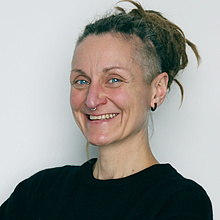
After finishing her doctorate there was no future in research for the neurobiologist, Renata Ponce, in Mexico. “I always wanted to know how top-level research works; my mother was a biologist, my father a physicist. I basically grew up in a lab, but in Mexico there is very little investment in basic research; there are no jobs,” Ponce reports. So, to earn a living, she found a job in a hospital lab analysing blood samples. Her dream of working in research seemed to be over.
"When you come from one of the less highly developed countries you have learnt to reach conclusions under adverse circumstances."
But then the German biophysicist Susanne Wegmann contacted her. Wegmann had become a scout for the Humboldt Foundation and set about searching for talented scientists in South and Central America to boost her research group at the German Center for Neurodegenerative Diseases (DZNE). “I think it’s important that science doesn’t lose its talented people in regions of the world where they get cut off at a certain level because of general conditions over which they have absolutely no control,” Wegmann emphasises. Having succeeded with her scouting strategy in the Henriette Herz Scouting Programme, Wegmann activated her network in Latin America, wrote e-mails to selected contacts, asked for recommendations. Professor Gina Lorena Quirarte at the Universidad Nacional Autónoma de México (UNAM) suggested Renata Ponce.

"As a scout, I have the opportunity to enable outstanding young scientists from less privileged regions of the world to connect to the global scientific community. This is a small contribution to global equal opportunities."
The research talent didn’t think twice. Just a few weeks later, she was the proud possessor of a Humboldt Research Fellowship in Susanne Wegmann’s group “Protein Actions in Neurodegeneration” at DZNE in Berlin. The group’s work aims to understand the role of the tau protein in all its complexity. The tau protein is found in all the nerve cells of the central nervous system and is usually responsible for stabilising the cells. But when it is damaged it gets deposited in the neurons and stops them functioning properly, symptoms that occur in Alzheimer’s and other forms of dementia. In the long run, Susanne Wegmann’s group wants to answer the questions as to how the pathological changes in the tau protein that play a crucial role in the emergence of various neurodegenerative diseases come about – and how they can be prevented.
Renata Ponce was able to contribute a piece to the puzzle. Whilst working on her dissertation at UNAM in Querétaro, she had investigated how stress affected the memories of rats, how it impacted their brain cells. In Berlin she is now working with in-vitro cell models and neurons in a cell culture to explore how the stressors, e.g., the stress hormones cortisol and its derivatives, change the tau protein. Once a week, she discusses her findings with Susanne Wegmann who sees mentoring as her most important duty as a host.
The future of science doesn’t lie with lone warriors, but in dedicated mentoring and people who ask how their staff members are doing.
“I had extremely good mentors who passed on their knowledge to me and have played a big part in my success,” explains the DZNE group leader who, this very year, was awarded the Rainwater Prize for Innovative Early-Career Scientists. “The future of science doesn’t lie with lone warriors, but in dedicated mentoring and people who ask how their staff members are doing: have they got everything they need to get on?” In order to stop women from becoming discouraged because most leading positions in science are still held by men, Wegmann’s mentoring role is particularly important to her in ensuring equal opportunities and diversity are not just catchwords. “If I know how I can and must assert myself in a male-dominated system, how to overcome hurdles, then I should certainly leverage opportunities like the Humboldt Foundation’s Scouting Programme to pass on my knowledge to other women,” she is convinced.
Now, Renata Ponce can benefit from this. “When you come from one of the less highly developed countries or from an emerging economy you have learnt to reach conclusions under adverse circumstances, to deal with irregularities and shortages, find ways of working around things, be creative. This ability and the fantastic research conditions here at Charité now come together. I have the feeling that they drive each other, and that is very empowering,” she explains. Ponce now has the opportunity to publish the research findings she has achieved in the last months and those to come in a prestigious publishing venue. When she embarked on her Germany adventure at such short notice last autumn, she negotiated with her employer in Mexico to hold her position open for her at the hospital. It is, however, much more likely that the postdoc position at DZNE in Berlin will kick-start her international career in brain research. “It is fantastic to see how much energy, motivation and creativity Renata is displaying in her research. These are exactly the attributes that will take her forward in her academic career,” says mentor Susanne Wegmann.
